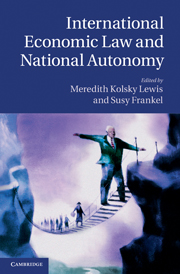Book contents
- Frontmatter
- Contents
- Notes on contributors
- Acknowledgements
- Introduction
- PART I International economic law: conceptions of convergence and divergence
- PART II WTO treaty interpretation: implications and consequences
- PART III Responding to international economic law commitments
- PART IV Transformations in international economic law
- Index
Introduction
Published online by Cambridge University Press: 10 January 2011
- Frontmatter
- Contents
- Notes on contributors
- Acknowledgements
- Introduction
- PART I International economic law: conceptions of convergence and divergence
- PART II WTO treaty interpretation: implications and consequences
- PART III Responding to international economic law commitments
- PART IV Transformations in international economic law
- Index
Summary
The multiplicity of commitments resulting from the World Trade Organization (WTO), free trade agreements (FTAs), bilateral investment treaties and other agreements has increasingly complicated the nature of national obligations. The World Bank and IMF further impinge on national autonomy by imposing a variety of conditions on loans and other forms of funding. All of these treaty obligations impact on governments' ability to exercise complete autonomy in the establishing and administering of national policy objectives. In particular, the rules and decisions arising from these international agreements and financial institutions result in limitations on countries' ability to make a wide range of regulatory decisions, including those relating to health, environment, immigration and other issues of national importance. Until relatively recently, these types of regulatory matters were regarded as policies almost exclusively to be determined by sovereign nations. At the same time that international agreements pose constraints on national regulatory autonomy, there remains considerable national autonomy in relation to how to comply with the variety of obligations the agreements impose. This tension between international cooperation and autonomy to act in the national interest is the core theme running through this collection.
The complex interplay between international economic law and national autonomy presents such a variety of interesting legal issues that we decided to make this the theme of the inaugural conference of the New Zealand Centre of International Economic Law (NZCIEL).
- Type
- Chapter
- Information
- International Economic Law and National Autonomy , pp. 1 - 4Publisher: Cambridge University PressPrint publication year: 2010

